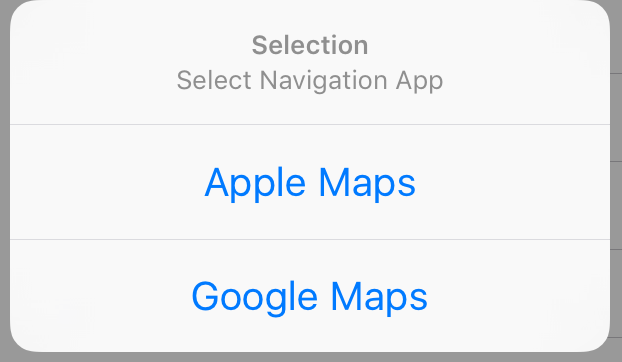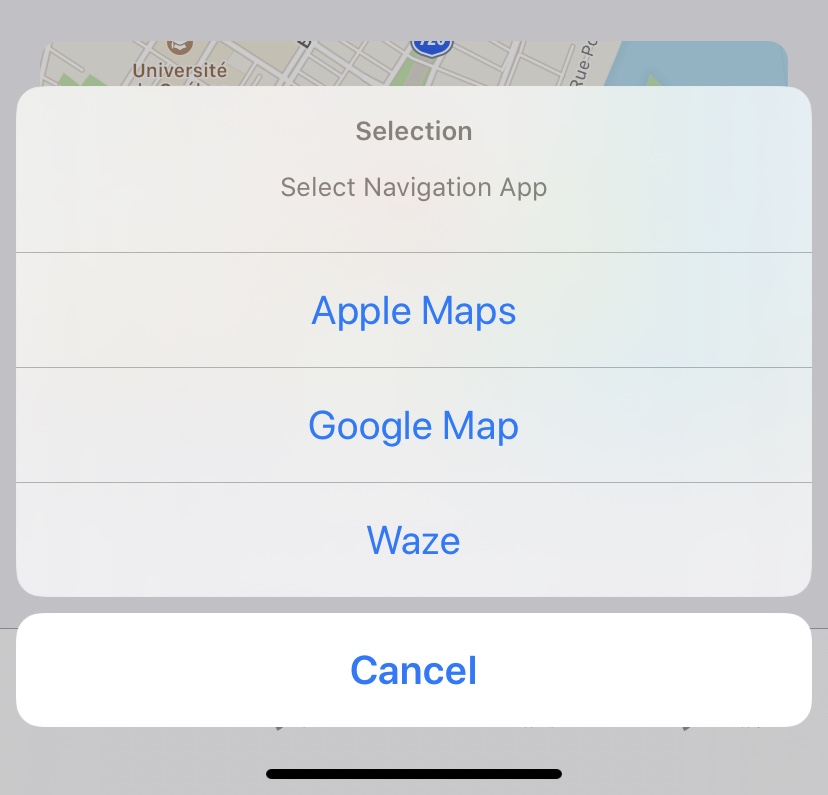I have a view controller with map kit integrated. I need to shoot an alert before opening that map, asking to choose from all similar applications of maps to open it with. For instance, if google maps app is installed in my iPhone, there should be an option for it, along with the default mapkit view. Is there a possibility to achieve this functionality which scans every similar app from iphone and returns the result as options to open map with.
Swift 5+ solution based on previous answers, this one shows a selector between Apple Maps, Google Maps, Waze and City Mapper. It also allows for some optional location title (for those apps that support it) and presents the alert only if there are more than 1 option (it opens automatically if only 1, or does nothing if none).
func openMaps(latitude: Double, longitude: Double, title: String?) {
let application = UIApplication.shared
let coordinate = "\(latitude),\(longitude)"
let encodedTitle = title?.addingPercentEncoding(withAllowedCharacters: .urlQueryAllowed) ?? ""
let handlers = [
("Apple Maps", "http://maps.apple.com/?q=\(encodedTitle)&ll=\(coordinate)"),
("Google Maps", "comgooglemaps://?q=\(coordinate)"),
("Waze", "waze://?ll=\(coordinate)"),
("Citymapper", "citymapper://directions?endcoord=\(coordinate)&endname=\(encodedTitle)")
]
.compactMap { (name, address) in URL(string: address).map { (name, $0) } }
.filter { (_, url) in application.canOpenURL(url) }
guard handlers.count > 1 else {
if let (_, url) = handlers.first {
application.open(url, options: [:])
}
return
}
let alert = UIAlertController(title: R.string.localizable.select_map_app(), message: nil, preferredStyle: .actionSheet)
handlers.forEach { (name, url) in
alert.addAction(UIAlertAction(title: name, style: .default) { _ in
application.open(url, options: [:])
})
}
alert.addAction(UIAlertAction(title: R.string.localizable.cancel(), style: .cancel, handler: nil))
contextProvider.currentViewController.present(alert, animated: true, completion: nil)
}
Note this solution uses R.swift for string localization but you can replace those with NSLocalizedString normally, and it uses a contextProvider.currentViewController to get the presented UIViewController, but you can replace it with self if you are calling this in a view controller already.
As usual, you need to also add the following to your app Info.plist:
<key>LSApplicationQueriesSchemes</key>
<array>
<string>citymapper</string>
<string>comgooglemaps</string>
<string>waze</string>
</array>
You can create an array of checks to map the installed apps using sumesh's answer [1]:
var installedNavigationApps : [String] = ["Apple Maps"] // Apple Maps is always installed
and with every navigation app you can think of:
if (UIApplication.sharedApplication().canOpenURL(url: NSURL)) {
self.installedNavigationApps.append(url)
} else {
// do nothing
}
Common navigation apps are:
- Google Maps - NSURL(string:"comgooglemaps://")
- Waze - NSURL(string:"waze://")
- Navigon - NSURL(string:"navigon://")
- TomTom - NSURL(string:"tomtomhome://")
A lot more can be found at: http://wiki.akosma.com/IPhone_URL_Schemes
After you created your list of installed navigation apps you can present an UIAlertController:
let alert = UIAlertController(title: "Selection", message: "Select Navigation App", preferredStyle: .ActionSheet)
for app in self.installNavigationApps {
let button = UIAlertAction(title: app, style: .Default, handler: nil)
alert.addAction(button)
}
self.presentViewController(alert, animated: true, completion: nil)
Of course you need to add the behavior of a button click in the handler with the specified urlscheme. For example if Google Maps is clicked use something like this:
UIApplication.sharedApplication().openURL(NSURL(string:
"comgooglemaps://?saddr=&daddr=\(place.latitude),\(place.longitude)&directionsmode=driving")!) // Also from sumesh's answer
With only Apple Maps and Google Maps installed this will yield something like this:
Swift 5+
Base on @Emptyless answer.
import MapKit
func openMapButtonAction() {
let latitude = 45.5088
let longitude = -73.554
let appleURL = "http://maps.apple.com/?daddr=\(latitude),\(longitude)"
let googleURL = "comgooglemaps://?daddr=\(latitude),\(longitude)&directionsmode=driving"
let wazeURL = "waze://?ll=\(latitude),\(longitude)&navigate=false"
let googleItem = ("Google Map", URL(string:googleURL)!)
let wazeItem = ("Waze", URL(string:wazeURL)!)
var installedNavigationApps = [("Apple Maps", URL(string:appleURL)!)]
if UIApplication.shared.canOpenURL(googleItem.1) {
installedNavigationApps.append(googleItem)
}
if UIApplication.shared.canOpenURL(wazeItem.1) {
installedNavigationApps.append(wazeItem)
}
let alert = UIAlertController(title: "Selection", message: "Select Navigation App", preferredStyle: .actionSheet)
for app in installedNavigationApps {
let button = UIAlertAction(title: app.0, style: .default, handler: { _ in
UIApplication.shared.open(app.1, options: [:], completionHandler: nil)
})
alert.addAction(button)
}
let cancel = UIAlertAction(title: "Cancel", style: .cancel, handler: nil)
alert.addAction(cancel)
present(alert, animated: true)
}
Also put these in your info.plist:
<key>LSApplicationQueriesSchemes</key>
<array>
<string>googlechromes</string>
<string>comgooglemaps</string>
<string>waze</string>
</array>
Cheers!
Swift 5+ solution based on previous answers, this one shows a selector between Apple Maps, Google Maps, Waze and City Mapper. It also allows for some optional location title (for those apps that support it) and presents the alert only if there are more than 1 option (it opens automatically if only 1, or does nothing if none).
func openMaps(latitude: Double, longitude: Double, title: String?) {
let application = UIApplication.shared
let coordinate = "\(latitude),\(longitude)"
let encodedTitle = title?.addingPercentEncoding(withAllowedCharacters: .urlQueryAllowed) ?? ""
let handlers = [
("Apple Maps", "http://maps.apple.com/?q=\(encodedTitle)&ll=\(coordinate)"),
("Google Maps", "comgooglemaps://?q=\(coordinate)"),
("Waze", "waze://?ll=\(coordinate)"),
("Citymapper", "citymapper://directions?endcoord=\(coordinate)&endname=\(encodedTitle)")
]
.compactMap { (name, address) in URL(string: address).map { (name, $0) } }
.filter { (_, url) in application.canOpenURL(url) }
guard handlers.count > 1 else {
if let (_, url) = handlers.first {
application.open(url, options: [:])
}
return
}
let alert = UIAlertController(title: R.string.localizable.select_map_app(), message: nil, preferredStyle: .actionSheet)
handlers.forEach { (name, url) in
alert.addAction(UIAlertAction(title: name, style: .default) { _ in
application.open(url, options: [:])
})
}
alert.addAction(UIAlertAction(title: R.string.localizable.cancel(), style: .cancel, handler: nil))
contextProvider.currentViewController.present(alert, animated: true, completion: nil)
}
Note this solution uses R.swift for string localization but you can replace those with NSLocalizedString normally, and it uses a contextProvider.currentViewController to get the presented UIViewController, but you can replace it with self if you are calling this in a view controller already.
As usual, you need to also add the following to your app Info.plist:
<key>LSApplicationQueriesSchemes</key>
<array>
<string>citymapper</string>
<string>comgooglemaps</string>
<string>waze</string>
</array>
A SwiftUI approach based on @Angel G. Olloqui answer:
struct YourView: View { @State private var showingSheet = false var body: some View { VStack { Button(action: { showingSheet = true }) { Text("Navigate") } } .actionSheet(isPresented: $showingSheet) { let latitude = 45.5088 let longitude = -73.554 let appleURL = "http://maps.apple.com/?daddr=\(latitude),\(longitude)" let googleURL = "comgooglemaps://?daddr=\(latitude),\(longitude)&directionsmode=driving" let wazeURL = "waze://?ll=\(latitude),\(longitude)&navigate=false" let googleItem = ("Google Map", URL(string:googleURL)!) let wazeItem = ("Waze", URL(string:wazeURL)!) var installedNavigationApps = [("Apple Maps", URL(string:appleURL)!)] if UIApplication.shared.canOpenURL(googleItem.1) { installedNavigationApps.append(googleItem) } if UIApplication.shared.canOpenURL(wazeItem.1) { installedNavigationApps.append(wazeItem) } var buttons: [ActionSheet.Button] = [] for app in installedNavigationApps { let button: ActionSheet.Button = .default(Text(app.0)) { UIApplication.shared.open(app.1, options: [:], completionHandler: nil) } buttons.append(button) } let cancel: ActionSheet.Button = .cancel() buttons.append(cancel) return ActionSheet(title: Text("Navigate"), message: Text("Select an app..."), buttons: buttons) } } }
Also, add the following to your Info.plist
<key>LSApplicationQueriesSchemes</key> <array> <string>googlechromes</string> <string>comgooglemaps</string> <string>waze</string> </array>
For anyone else looking for something similar you can now use UIActivityViewController, its the same UIControl Photos or Safari use when you click on the share button.
For apple maps and google maps you can add custom application activity to show alongside the other items. You need to subclass UIActivity and override the title and image methods. And the perform() function to handle the tap on our custom item
below is Objective C code i wrote for the same. For Swift code you can refer UIActivityViewController swift
NSMutableArray *activityArray = [[NSMutableArray alloc] init];
// Check if google maps is installed and accordingly add it in menu
if ([[UIApplication sharedApplication] canOpenURL:[NSURL URLWithString:@"comgooglemaps://"]]) {
GoogleMapsActivityView *googleMapsActivity = [[GoogleMapsActivityView alloc] init];
[activityArray addObject:googleMapsActivity];
}
// Check if apple maps is installed and accordingly add it in menu
if ([[UIApplication sharedApplication] canOpenURL:[NSURL URLWithString:@"maps://"]]) {
AppleMapsActivityView *appleMapsActivity = [[AppleMapsActivityView alloc] init];
[activityArray addObject:appleMapsActivity];
}
NSArray *currentPlaces = [NSArray arrayWithObject:place];
UIActivityViewController *activityViewController =
[[UIActivityViewController alloc] initWithActivityItems:currentPlaces
applicationActivities:activityArray];
activityViewController.excludedActivityTypes = @[UIActivityTypePrint,
UIActivityTypeCopyToPasteboard,
UIActivityTypeAssignToContact,
UIActivityTypeSaveToCameraRoll,
UIActivityTypePostToWeibo,
UIActivityTypeAddToReadingList,
UIActivityTypePostToVimeo,
UIActivityTypeAirDrop];
[self presentViewController:activityViewController animated:YES completion:nil];
And Subclass the GoogleMapsActivity
@interface GoogleMapsActivityView: UIActivity
@end
@implementation GoogleMapsActivityView
- (NSString *)activityType {
return @"yourApp.openplace.googlemaps";
}
- (NSString *)activityTitle {
return NSLocalizedString(@"Open with Google Maps", @"Activity view title");
}
- (UIImage *)activityImage {
return [UIImage imageNamed:@"ic_google_maps_logo"];
}
- (UIActivityCategory)activityCategory {
return UIActivityCategoryAction;
}
- (BOOL)canPerformWithActivityItems:(NSArray *)activityItems {
return YES;
}
- (void)performActivity {
CLLocationDegrees lat = 99999;
CLLocationDegrees lng = 99999;
NSString *latlong = [NSString stringWithFormat:@"%.7f,%@%.7f", lat, @"", lng];
NSString *urlString = [NSString stringWithFormat:@"comgooglemaps://?q=%@", latlong];
if ([[UIApplication sharedApplication] canOpenURL:[NSURL URLWithString:urlString]]) {
[[UIApplication sharedApplication] openURL:[NSURL URLWithString:urlString]
options:@{}
completionHandler:nil];
}
[self activityDidFinish:YES];
}
SwiftUI rewrite from previous solutions using enums and a view modifier
extension View {
func opensMap(at location: LocationCoordinate2D) -> some View {
return self.modifier(OpenMapViewModifier(location: location))
}
}
struct OpenMapViewModifier: ViewModifier {
enum MapApp: CaseIterable {
case apple, gmaps
var title: String {
switch self {
case .apple: return "Apple Maps"
case .gmaps: return "Google Maps"
}
}
var scheme: String {
switch self {
case .apple: return "http"
case .gmaps: return "comgooglemaps"
}
}
var isInstalled: Bool {
guard let url = URL(string: self.scheme.appending("://")) else { return false }
return UIApplication.shared.canOpenURL(url)
}
func url(for location: LocationCoordinate2D) -> URL? {
switch self {
case .apple:
return URL(string: "\(self.scheme)://maps.apple.com/?daddr=\(location.latitude),\(location.longitude)")
case .gmaps:
return URL(string: "\(self.scheme)://?daddr=\(location.latitude),\(location.longitude)&directionsmode=driving")
}
}
}
var location: LocationCoordinate2D
@State private var showingAlert: Bool = false
private let installedApps = MapApp.allCases.filter { $0.isInstalled }
func body(content: Content) -> some View {
Button(action: {
if installedApps.count > 1 {
showingAlert = true
} else if let app = installedApps.first, let url = app.url(for: location) {
UIApplication.shared.open(url, options: [:], completionHandler: nil)
}
}) {
content.actionSheet(isPresented: $showingAlert) {
let appButtons: [ActionSheet.Button] = self.installedApps.compactMap { app in
guard let url = app.url(for: self.location) else { return nil }
return .default(Text(app.title)) {
UIApplication.shared.open(url, options: [:], completionHandler: nil)
}
}
return ActionSheet(title: Text("Navigate"), message: Text("Select an app..."), buttons: appButtons + [.cancel()])
}
}
}
}
© 2022 - 2024 — McMap. All rights reserved.


